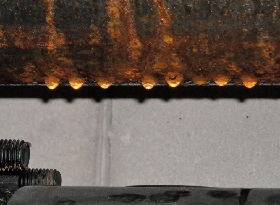Mould in basement

Basement is naturally one of the places where mould can establish itself more easily than anywhere else in the house. Basements tend to suffer mostly from rising damp problems, flooding during period of heavy downfall or penetrating moisture through the walls. The problem is most prominent in the old properties where the previously installed water protection measures have deteriorated or failed completely.
Once mould has established itself in the basement it will probably go unnoticed for a long time since people don't spend much time in their basements. People rarely clean their basements too and the dust and dirt helps mould to grow.Discovering mould in basement is usually not much of problem thanks to simple construction and poor ventilation which allows mould related odours to accumulate. The typical musty, earthy odours are associated with moulds and are results of their biological activity on materials.
Causes of mould in basement

The most common problem starting mould in basement is condensation. High humidity coupled with low temperatures results in water vapour condensation in walls and stored materials. In recent years manly due to the higher frequency of heavy rainfall flooding of basements and subsequent mould contamination has become much more frequent. If the basement is thoroughly or partially flooded the water penetrates the brickworks and it takes a long time and effort to dry it out. Flooding can results in very serious mould contamination. Saturation of materials with water creates the right kind of condition required by slow growing toxic mould to spread.
Once water in the basement evaporates it raises the humidity level in the basement. The humidity then usually stays high thanks to poor air circulation. Moulds will began to grow in basement as soon the relative humidity close to the surface of the wall exceeds 70% .
Preventing mould in basement
You can take steps to prevent mould growing in your basement. You should keep the basement tidy with a reasonable amount of stored material. Be careful putting shelved or storing materials close to the walls which have sigh of moisture on them. This will trap the air between the wall and the items and mould will start growing very quickly. Check if the air brick have been installed and if they are clear. If you noticing signs of stagnant air install a fan before is too late.
If the humidity in your basement is too high try to reduce it with dehumidifiers. You should be aiming for around 50% humidity. Always repair any leaking pipes and install insulation around exposed metal pipes.
Water building up in the ground around the basement can cause water problems, especially if the ground is sloped toward the house. Landscaping the ground so it slopes away from your house slightly, or digging drains to channel the water away should solve this problem.
